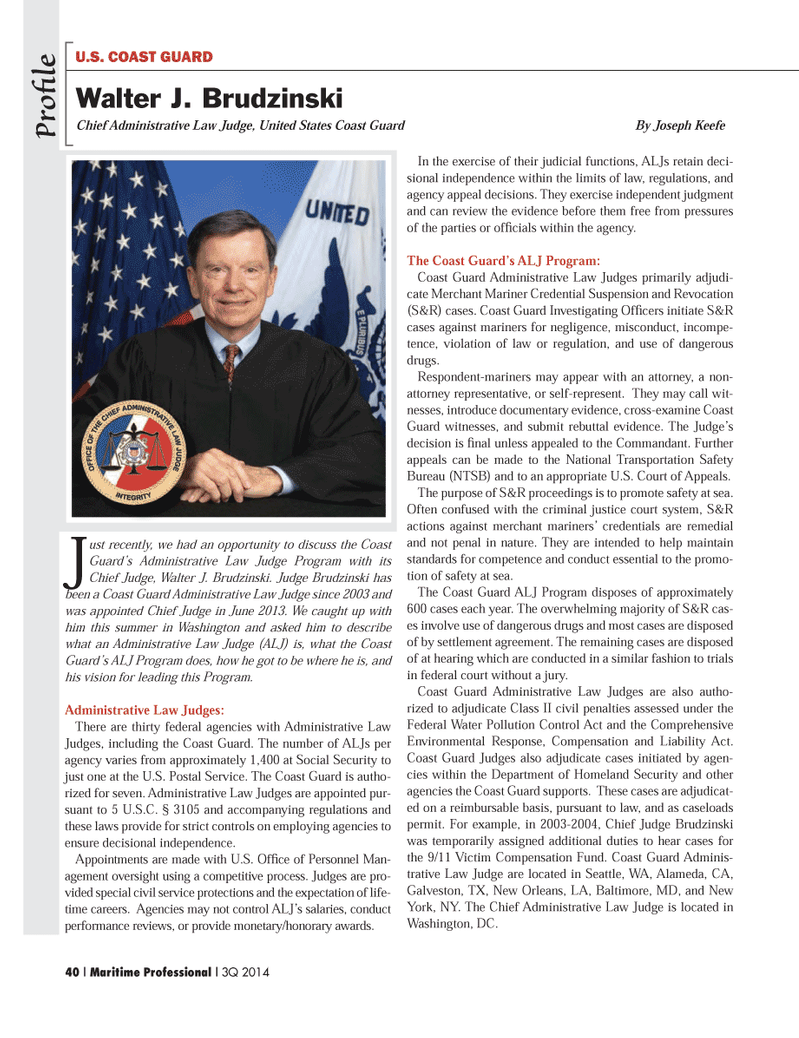
Page 40: of Maritime Logistics Professional Magazine (Q3 2014)
Power & Fuel Management
Read this page in Pdf, Flash or Html5 edition of Q3 2014 Maritime Logistics Professional Magazine
40 | Maritime Professional | 3Q 2014Just recently, we had an opportunity to discuss the Coast Guard?s Administrative Law Judge Program with its Chief Judge, Walter J. Brudzinski. Judge Brudzinski has been a Coast Guard Administrative Law Judge since 2003 and was appointed Chief Judge in June 2013. We caught up with him this summer in Washington and asked him to describe what an Administrative Law Judge (ALJ) is, what the Coast Guard?s ALJ Program does, how he got to be where he is, and his vision for leading this Program. Administrative Law Judges: There are thirty federal agencies with Administrative Law Judges, including the Coast Guard. The number of ALJs per agency varies from approximately 1,400 at Social Security to just one at the U.S. Postal Service. The Coast Guard is autho- rized for seven. Administrative Law Judges are appointed pur- suant to 5 U.S.C. § 3105 and accompanying regulations and these laws provide for strict controls on employing agencies to ensure decisional independence.Appointments are made with U.S. Of ce of Personnel Man- agement oversight using a competitive process. Judges are pro- vided special civil service protections and the expectation of life- time careers. Agencies may not control ALJ?s salaries, conduct performance reviews, or provide monetary/honorary awards. In the exercise of their judicial functions, ALJs retain deci- sional independence within the limits of law, regulations, and agency appeal decisions. They exercise independent judgment and can review the evidence before them free from pressures of the parties or of cials within the agency. The Coast Guard?s ALJ Program: Coast Guard Administrative Law Judges primarily adjudi- cate Merchant Mariner Credential Suspension and Revocation (S&R) cases. Coast Guard Investigating Of cers initiate S&R cases against mariners for negligence, misconduct, incompe- tence, violation of law or regulation, and use of dangerous drugs. Respondent-mariners may appear with an attorney, a non- attorney representative, or self-represent. They may call wit- nesses, introduce documentary evidence, cross-examine Coast Guard witnesses, and submit rebuttal evidence. The Judge?s decision is nal unless appealed to the Commandant. Further appeals can be made to the National Transportation Safety Bureau (NTSB) and to an appropriate U.S. Court of Appeals. The purpose of S&R proceedings is to promote safety at sea. Often confused with the criminal justice court system, S&R actions against merchant mariners? credentials are remedial and not penal in nature. They are intended to help maintain standards for competence and conduct essential to the promo-tion of safety at sea. The Coast Guard ALJ Program disposes of approximately 600 cases each year. The overwhelming majority of S&R cas- es involve use of dangerous drugs and most cases are disposed of by settlement agreement. The remaining cases are disposed of at hearing which are conducted in a similar fashion to trials in federal court without a jury. Coast Guard Administrative Law Judges are also autho- rized to adjudicate Class II civil penalties assessed under the Federal Water Pollution Control Act and the Comprehensive Environmental Response, Compensation and Liability Act. Coast Guard Judges also adjudicate cases initiated by agen-cies within the Department of Homeland Security and other agencies the Coast Guard supports. These cases are adjudicat- ed on a reimbursable basis, pursuant to law, and as caseloads permit. For example, in 2003-2004, Chief Judge Brudzinski was temporarily assigned additional duties to hear cases for the 9/11 Victim Compensation Fund. Coast Guard Adminis- trative Law Judge are located in Seattle, WA, Alameda, CA, Galveston, TX, New Orleans, LA, Baltimore, MD, and New York, NY. The Chief Administrative Law Judge is located in Washington, DC. U.S. COAST GUARD Walter J. Brudzinski By Joseph Keefe Chief Administrative Law Judge, United States Coast Guard ProÞ le34-49 Q3 MP2014.indd 4034-49 Q3 MP2014.indd 408/13/2014 3:49:16 PM8/13/2014 3:49:16 PM

 39
39

 41
41
